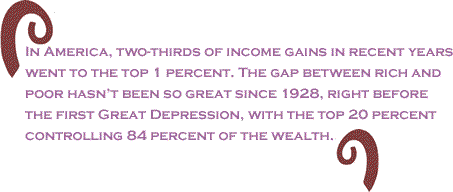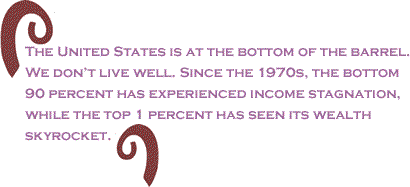|
This
is a commentary I was bound to write regardless of the outcome
of the midterm election. I start by saying that your country
is not so great, Americans. Any discussion of “what went
wrong” must be prefaced with that statement. Harsh words,
perhaps, but I do not utter them in haste. And we need
to say it over and over again until we change it.
The United States is at the bottom of the barrel. We don’t
live well. Since the 1970s, the bottom 90 percent has experienced
income stagnation, while the top 1 percent has seen its
wealth skyrocket. In America, two-thirds of income gains
in recent years went to the top 1 percent. The gap between
rich and poor hasn’t been so great since 1928, right before
the first Great Depression, with the top
20 percent controlling 84 percent of the wealth. In
Sweden, the top 20 percent owns 36 percent. Canada
and Western Europe all have greater social mobility than
the so-called “land of opportunity,” and with far more generous
benefits, over a month of vacation, real universal health
care—you get the picture. If the citizens of all of these
advanced nations are living better than Americans, then
what is so special about America?

And yet, this recent election is a testament to this country’s
proclivity—with help from the bottom 90 percent—to keep
things the way they are, if not worsen them. Some people
vote with the oligarchy against their own interests because
they simply lack the proper information. There’s lots of
blame to go around.
Turnout
from the base.
Young
voters and African-Americans, a key part of the Democratic base,
refused to show up in the numbers they should have to turn
this thing around. And 29
million people who voted in 2008 stayed home this year. If you don’t use
democracy you lose it. But then again, perhaps many felt
as if they had no reason to vote. And their silence is
as deafening as the noise made in the voting booth. There
is no question that the president lost touch with his soldiers,
far more than a hundred interviews on black radio could
ever make up. This is not to excuse those who sat out of
the race, but it’s trickier than that. The reality is that
the White House appeared arrogant and distant, even dismissive
and impatient towards its progressive supporters-turned-critics.
Obama must answer to the voters, not scold them, but he
got it twisted somewhere along the way.
Anti-Wall
Street sentiment.
Clearly, the voters who went against the Democrats were
mad at Wall Street. One would conclude that an anti-Wall
Street fervor should favor the Democrats. But the Democrats
are as much a party of corporate enablers as are the Republicans.
Obama decided to cozy up to the bankers and prop them up
rather than tear them down for the havoc they engineered.
Plus, he surrounded himself with dead weight— Wall Street
shills and neoliberal Clinton insiders among his closest
advisors. These individuals have utter contempt for unions,
“the professional left” and other components of the base.
This was not the change the Obama supporters thought they
were getting in November 2008. Meanwhile, average Americans
observed that as they struggled through hard times, with
mounting bills, chronic unemployment and foreclosures, the
banks were not left wanting.
Compromise. “We were in such a hurry to get things done
that we didn't change how things got done,” President Obama
said. And he is right. Cutting deals with lobbyists and
watering down health care reform for the sake of putting
another notch in your belt is the old way of doing things.
Compromising with the other side from a position of weakness
and giving away the store before the negotiations even start—well
that’s just plain naïve.

Also naïve was the administration’s
belief that it could compromise with Republicans, the extremists
who awake every morning wishing and hoping for his downfall.
Perhaps it would have been possible decades ago, but not
now. Wasting too much time on this quixotic dream of compromise
as an end, rather than one of various possible means to
an end, gave the Republicans their opening. Now, the GOP
is even more extreme, racist and uncompromising after its
Teabilly infusion of white supremacists, Christian Taliban,
conspiracy theorists and certified kooks.
A weak, fraidy cat administration. Obama failed to exert
his power and authority in many ways, often appearing weak
and equivocating. His heart just wasn’t in it. The stimulus
was a half measure that was not bold enough, and contained
tax cuts designed to attract Republican support that never
came. The plan failed to restore the 11.5
million jobs needed to get America back to pre-recession levels. And Obama continued
Bush’s trillion
dollar folly in Iraq and Afghanistan. Bigger than the rest of the world’s
armies combined, the U.S. war machine sucks up nearly half
of the discretionary dollars in the federal budget, crippling
our ability to compete with China.
Obama did not take the
jobs problem seriously enough soon enough, and the lunatic
right gave him a beat down with it, dismissing his entire
agenda as ineffective and creating a top-down faux populist
movement to mess him up. The Citizens United decision
all but guaranteed a conservative multi-billion dollar buyout
of the election by the Koch brothers, the U.S. Chamber of
Commerce, Fox and an array of sketchy, shady interests,
anonymous and unaccountable.
The Economy and F.D.R. It’s the economy stupid, but it’s what you do and say as a leader
in tough economic times that matters. Oddly, candidate
Obama’s effective communication strategy has not translated
into President Obama the great communicator. The use of
the narrative is important, particularly in bad times, and
Reagan knew it. President Obama could have traveled the
F.D.R. route and crafted a message of economic populism,
with Wall Street greed and predatory capitalism as the clear
enemy, and himself as the national hero who has come to
make things right. If the narrative resonates with an approving
public, who cares which party controls Congress?
President Roosevelt betrayed
his class, saying “I ask you to judge me by the enemies
I have made.” In his inauguration speech, he said the “Practices of the unscrupulous money changers stand indicted in the
court of public opinion, rejected by the hearts and minds
of men…. The measure of the restoration lies in the extent
to which we apply social values more noble than mere monetary
profit.”
Not having sought enemies—though the enemies found him— Obama
chose not to follow F.D.R., and is paying a price. Yet
he must do this very thing if he wants a second term.

A
New Movement. A sustainable movement for social
and economic justice must help this president to place him
on the path of greatness that these crisis times demand,
that his campaign promised. Nothing less than America’s
future is at stake. Whether it is an internal effort to
wrest control from the corporatist neoliberals smothering
the Democratic Party, or an independent movement, or both,
it must be done. I refer to this genuinely organic, bottom-up
antithesis of the Tea Party as the “Hot Chocolate” Party,
to coin a term from my father-in-law. Hot chocolate is
a sweet mix of diverse ingredients that brings comfort on
cold days. Minimally caffeinated compared to tea, it can
ease fatigue and positively affect health.

Despite their immediate victory, it is almost certain that
the GOP Hate Caucus is running on borrowed time. It is
expected they
will disappoint immensely. Devoid of ideas, they will die from a combination
of infighting, overreaching, and insurmountable demographic
shifts in the nation. But in the meantime, progressives
must sustain a movement to provide cover and apply pressure
to Obama and any subsequent presidents.
Roosevelt asked civil rights leader A. Phillip Randolph to
“go out and make me do it,” that is, make him use his power
and the bully pulpit to right the wrongs and do the things
they both agreed should be addressed. We, too, must make
Obama do it, for him and for ourselves.
BlackCommentator.com Executive
Editor, David A. Love, JD is a journalist and human rights
advocate based in Philadelphia, and a contributor to The Huffington Post, theGrio, The Progressive
Media Project, McClatchy-Tribune News Service, In These Times and Philadelphia Independent Media Center. He also blogs at davidalove.com, NewsOne, Daily Kos,
and Open Salon. Click here to contact Mr. Love.
|

